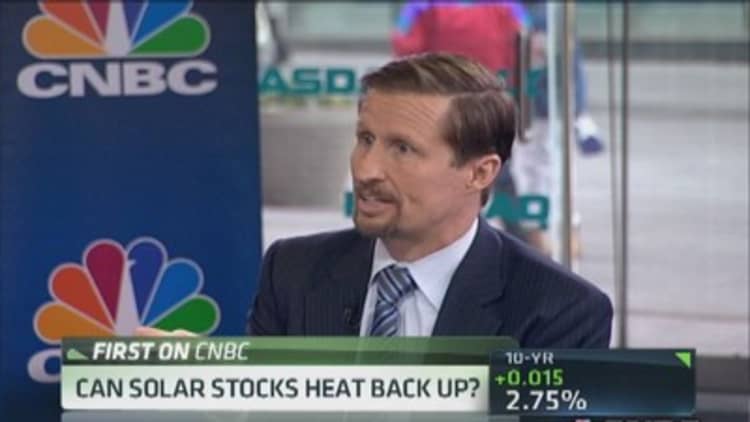In recent years, analysts have debated whether alternative energy stocks are directly correlated to the price of crude oil. The thinking goes that pricier oil pushes renewable energy companies higher, as investors and consumers search for cheaper alternatives to fossil fuels.
But for a host of reasons, the link between solar and crude prices has begun to break down completely. The uncoupling highlights how, after years of false starts, renewables may finally be coming into their own as an investment class.
"The correlations in the past [between crude and alternative energy] have been very high, but in the last year they have dropped significantly," said Leo Kelly, partner and managing partner at HighTower's Kelly Wealth Management.
Read MoreChevron suffers Big Oil blues as US gushes fossil fuels
With a coefficient of "1" meaning direct correlation, Kelly said solar stocks traded as high as 0.7 to the price of oil just a few years ago, but in the last year that correlation has collapsed to virtually nil. At its peak, the renewable/crude link was nearly as high as the relationship between oil and big oil companies like ExxonMobil and ConocoPhillips, whose correlation to crude ran as high as 0.9 percent late last year.

Yet exactly how tight the link is between the two asset classes is disputed. The tenuous relationship has grown weaker now that the U.S. is on a path to energy independence.
Kelly attributed the decoupling between alternative energy and crude to the U.S. shale boom, which has seen the world's largest economy churn out nearly 10 percent of the world's oil, according to Energy Information Agency data. Last year, overall U.S. crude production rose to nearly 8 million barrels a day, and natural gas stockpiles also grew year over year.
"People are looking at the abundance in nat gas and wondering if alternative energy will kick into gear, because natural gas is so cheap," he said.
Read MoreA day in the sun: Solar's revival sends stocks on a tear
However, alternative energy stocks certainly have kicked into gear—and then some. For the first time in recent memory, renewable stocks are far outpacing their oil and gas counterparts, becoming an investment class in their own right.
Over the last year, solar bellwethers like First Solar and SolarCity have skyrocketed 156 percent and 221 percent, respectively. Those gains eclipse those of Big Oil and the spot prices of crude over the same period: Exxon is up a meager 6 percent year over year, while Conoco has risen 15 percent.
Pavel Molchanov, an energy analyst at Raymond James, counts himself among the skeptics of the link between alternative energy and oil. "Solar does not compete with oil. You do not put it in a gas tank," he said in an interview.
Using the CleanTech Index as a proxy for renewables, Molchanov said the index surged by nearly 60 percent in 2013. Simultaneously, crude prices saw modest gains: is up 4 percent over the last year, while West Texas Intermediate has risen 9 percent.
'Industry-specific' factors
"Solar does in an indirect sense compete with natural gas because both are ways of generating electric power," Molchanov said. Yet at a basic level renewable power "is not a petroleum substitute." Rather than crude, gains in the sector are driven much more "industry-specific" factors like technology innovation, input prices and capital spending, he said.
In that vein, investors are embracing solar based on the sector's merits. Research firm IHS said in research last week that spending on photovoltaic (PV) projects will surge by 45 percent globally this year, to $3.8 billion from $2.7 billion in 2013.
"Key factors such as market sentiment, PV demand and equipment-supplier bookings have continued to progress as a result of a healthy level of optimism," said Jon Campos, solar analyst at IHS.


